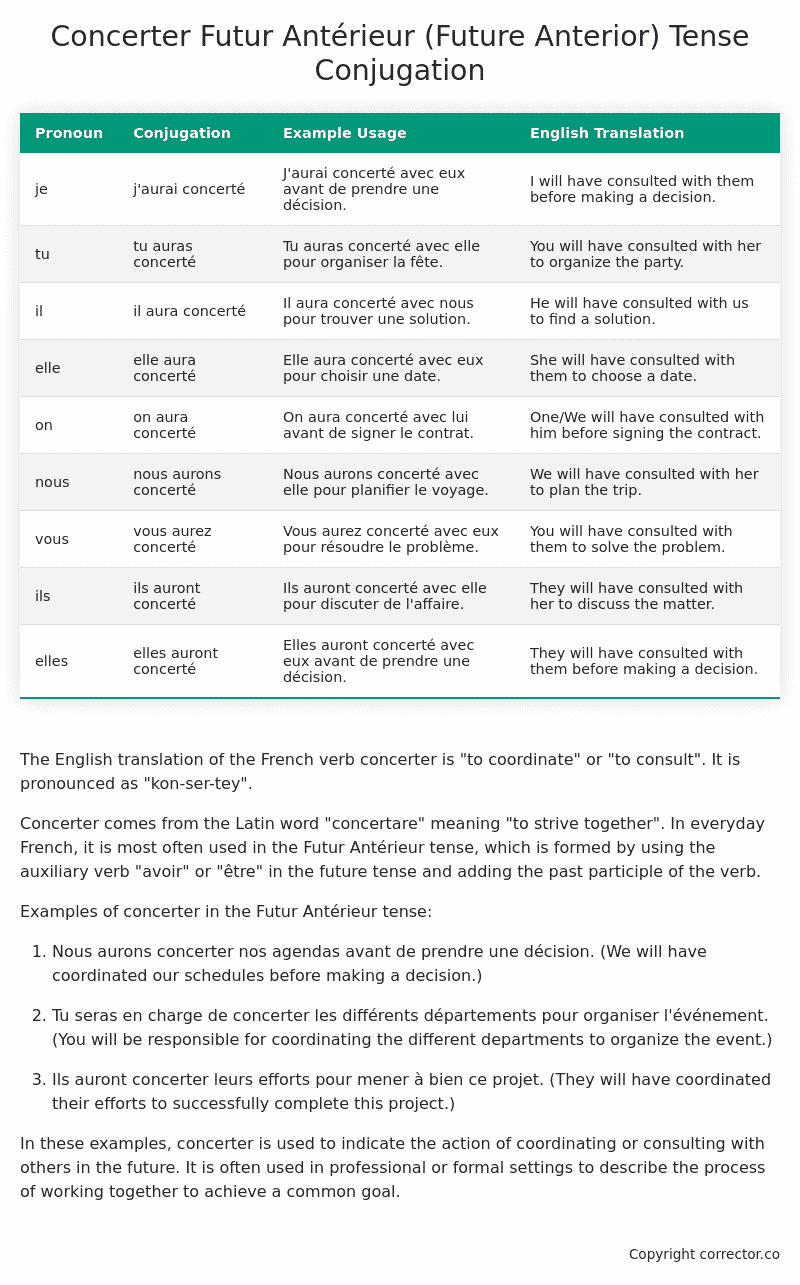Futur Antérieur (Future Anterior) Tense Conjugation of the French Verb concerter
Introduction to the verb concerter
The English translation of the French verb concerter is “to coordinate” or “to consult”. It is pronounced as “kon-ser-tey”.
Concerter comes from the Latin word “concertare” meaning “to strive together”. In everyday French, it is most often used in the Futur Antérieur tense, which is formed by using the auxiliary verb “avoir” or “être” in the future tense and adding the past participle of the verb.
Examples of concerter in the Futur Antérieur tense:
-
Nous aurons concerter nos agendas avant de prendre une décision. (We will have coordinated our schedules before making a decision.)
-
Tu seras en charge de concerter les différents départements pour organiser l’événement. (You will be responsible for coordinating the different departments to organize the event.)
-
Ils auront concerter leurs efforts pour mener à bien ce projet. (They will have coordinated their efforts to successfully complete this project.)
In these examples, concerter is used to indicate the action of coordinating or consulting with others in the future. It is often used in professional or formal settings to describe the process of working together to achieve a common goal.
Table of the Futur Antérieur (Future Anterior) Tense Conjugation of concerter
| Pronoun | Conjugation | Example Usage | English Translation |
|---|---|---|---|
| je | j’aurai concerté | J’aurai concerté avec eux avant de prendre une décision. | I will have consulted with them before making a decision. |
| tu | tu auras concerté | Tu auras concerté avec elle pour organiser la fête. | You will have consulted with her to organize the party. |
| il | il aura concerté | Il aura concerté avec nous pour trouver une solution. | He will have consulted with us to find a solution. |
| elle | elle aura concerté | Elle aura concerté avec eux pour choisir une date. | She will have consulted with them to choose a date. |
| on | on aura concerté | On aura concerté avec lui avant de signer le contrat. | One/We will have consulted with him before signing the contract. |
| nous | nous aurons concerté | Nous aurons concerté avec elle pour planifier le voyage. | We will have consulted with her to plan the trip. |
| vous | vous aurez concerté | Vous aurez concerté avec eux pour résoudre le problème. | You will have consulted with them to solve the problem. |
| ils | ils auront concerté | Ils auront concerté avec elle pour discuter de l’affaire. | They will have consulted with her to discuss the matter. |
| elles | elles auront concerté | Elles auront concerté avec eux avant de prendre une décision. | They will have consulted with them before making a decision. |
Other Conjugations for Concerter.
Le Present (Present Tense) Conjugation of the French Verb concerter
Imparfait (Imperfect) Tense Conjugation of the French Verb concerter
Passé Simple (Simple Past) Tense Conjugation of the French Verb concerter
Passé Composé (Present Perfect) Tense Conjugation of the French Verb concerter
Futur Simple (Simple Future) Tense Conjugation of the French Verb concerter
Futur Proche (Near Future) Tense Conjugation of the French Verb concerter
Plus-que-parfait (Pluperfect) Tense Conjugation of the French Verb concerter
Passé Antérieur (Past Anterior) Tense Conjugation of the French Verb concerter
Futur Antérieur (Future Anterior) Tense Conjugation of the French Verb concerter (this article)
Subjonctif Présent (Subjunctive Present) Tense Conjugation of the French Verb concerter
Subjonctif Passé (Subjunctive Past) Tense Conjugation of the French Verb concerter
Subjonctif Imparfait (Subjunctive Imperfect) Tense Conjugation of the French Verb concerter
Subjonctif Plus-que-parfait (Subjunctive Pluperfect) Tense Conjugation of the French Verb concerter
Conditionnel Présent (Conditional Present) Tense Conjugation of the French Verb concerter
Conditionnel Passé (Conditional Past) Tense Conjugation of the French Verb concerter
L’impératif Présent (Imperative Present) Tense Conjugation of the French Verb concerter
L’infinitif Présent (Infinitive Present) Tense Conjugation of the French Verb concerter
Struggling with French verbs or the language in general? Why not use our free French Grammar Checker – no registration required!
Get a FREE Download Study Sheet of this Conjugation 🔥
Simply right click the image below, click “save image” and get your free reference for the concerter Futur Antérieur tense conjugation!

Concerter – About the French Futur Antérieur (Future Anterior) Tense
Construction
Common Everyday Usage Patterns
Interactions with Other Tenses
For example
Summary
I hope you enjoyed this article on the verb concerter. Still in a learning mood? Check out another TOTALLY random French verb conjugation!


